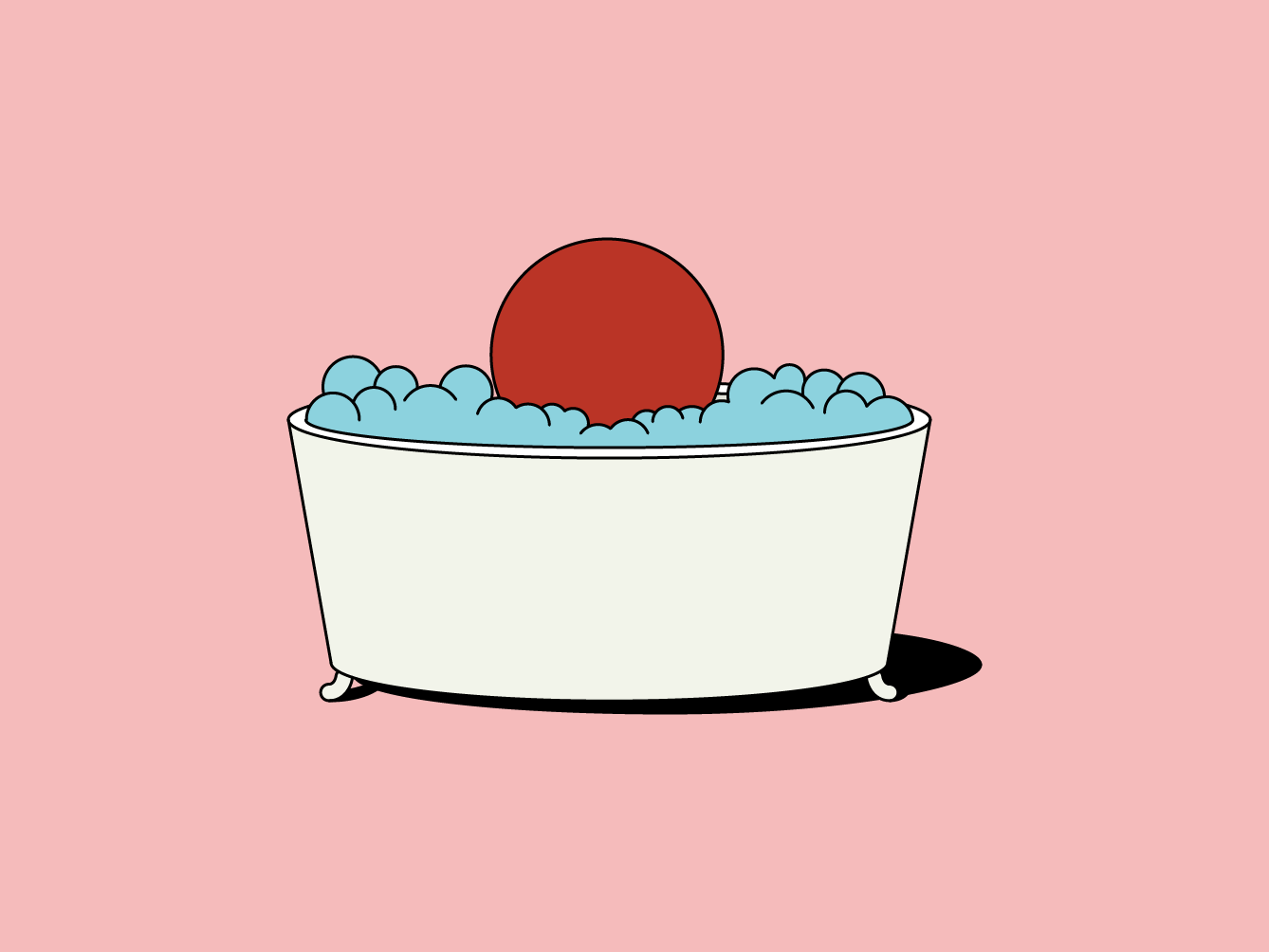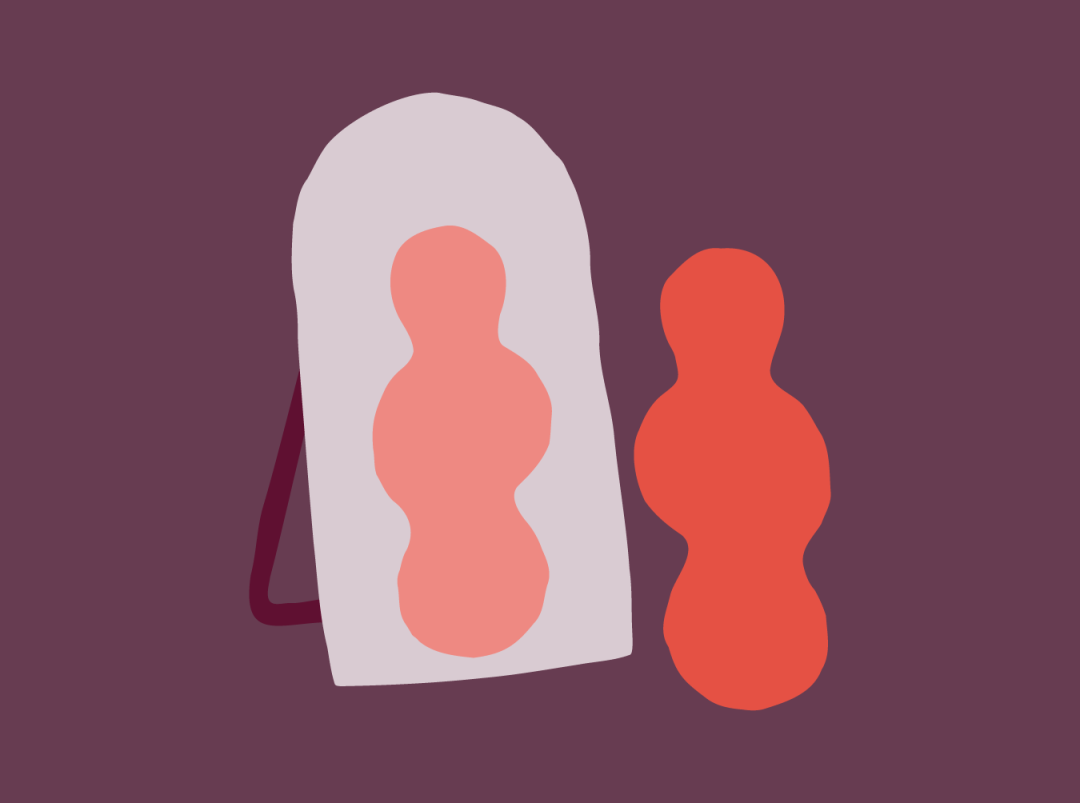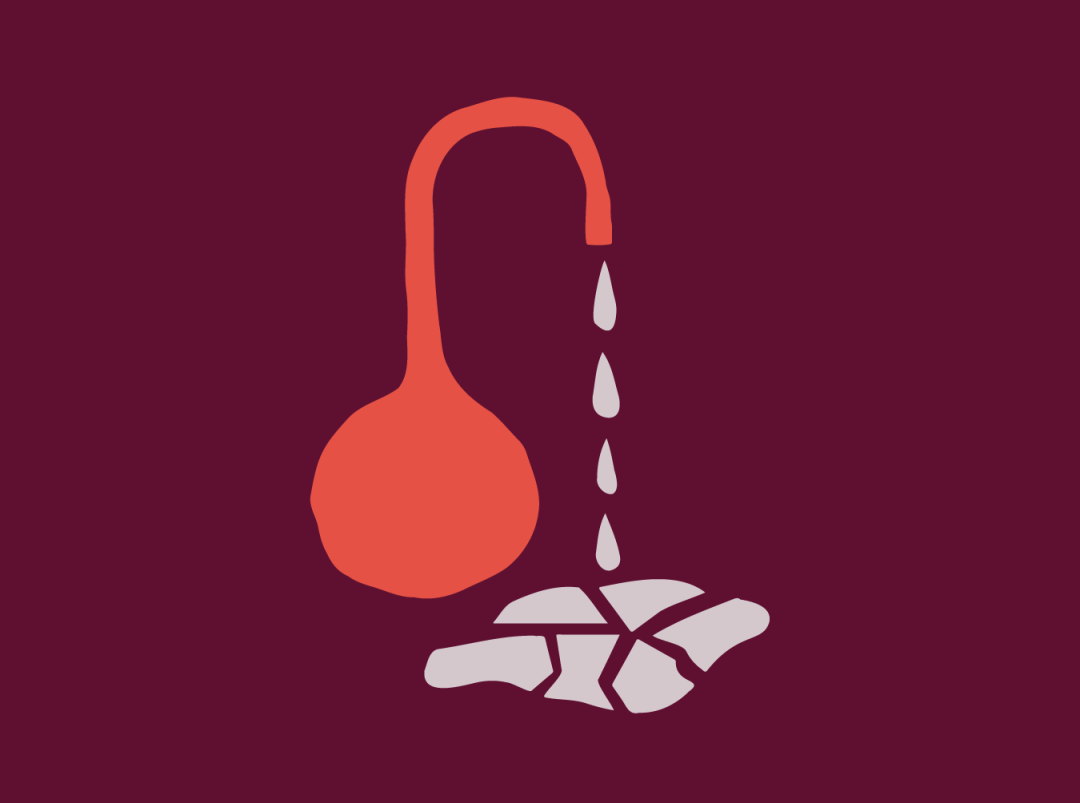#explainer
Can You Take a Bath On Your Period?
health
·5 min read

by Team Thinx | 06/14/2023
A hot bath is one of life’s simplest pleasures, and we’re not about to sacrifice our enjoyment of this classic self-care, self-soothing ritual. Despite the myths you may have heard, whether whispered in middle school bathrooms or posted and circulated online, you can absolutely enjoy a nice warm bath while you’re on your period.
So run the hot water, grab a fresh set of pajamas for your post-soak cozy time, and let’s debunk some old narratives about bathing during menstruation.
bathing on your period? beneficial, not banned
Nothing precludes you from soaking in warm water (or hot, or cold, depending on your preference) while you’re menstruating. In fact, it’s encouraged, as it can do you a whole lot of good — and we’ll look at all the reasons why in just a second. In the meantime, let’s get a few facts straight:
bathing doesn’t cause your period to stop
it doesn’t exacerbate it either, as far as the evidence suggests
it’s not unsafe (and neither is swimming while you’re on period)
Instead, bathing functions as a balm that can be hugely beneficial when you’re dealing with the physical and emotional side effects of your period.
a glimpse behind the myth
How did this blatant lie become part of our cultural understanding, anyway?
Some predict that it stretches far back in time, before showers existed and families shared a single bathtub.
It also stems from deeply entrenched cultural beliefs that a biological process as natural and necessary as menstruating is somehow dirty and shameful.
While some of us might readily agree to the first restriction when we’re on our periods (especially if you’re a teen with an older brother who loves to taunt you), the rest aren’t rooted in logic or accurate concerns for health and safety. Period blood isn’t toxic or dirty. And bathing can help, not hinder, your period.
what happens when you take a bath while on your period?
Nothing all that exciting, honestly. Just a calm, relaxing feeling and some health benefits.
Yes, your uterus will continue shedding its lining as you’re in the bathtub, but there’s nothing inherently gross about this. And while it looks like blood, “menstrual fluid” may be a more accurate descriptor. In addition to blood, it contains:
vaginal secretions
endometrial cells from your uterine wall
In other words, there’s nothing to be afraid of here; it’s just your body doing its thing. You also don’t need to use a tampon (although you can if you so wish — just be sure to change it after you’re done bathing).
A word of caution here, though, to save you from worrying that something is wrong: heat can increase blood flow. Theoretically, this suggests that a hot bath would stimulate you to release more of that menstrual fluid. However, many people actually experience less blood flow while submerged in water, whether that’s a bathtub or pool.
Further, the average amount of blood loss for a whole period is about 2.7 ounces — the amount of two and a half shot glasses. The amount of blood you’ll shed during a standard-length bath will most likely be minimal anyway.
If you do tend to bleed more, you may have menorrhagia (a fancy way to say heavy periods). And you know what experts suggest practicing when dealing with the complications of this condition? You guessed it: a hot bath.
what are the benefits of taking a bath while you’re on your period?
Baths are luxurious, yes, but they also have proven benefits to them — when you’re on your period and beyond. Here are three of the most promising advantages. (It’s okay if you stop reading mid-way through and beeline to your bathtub to see for yourself. We won’t blame you.)
#1 can diminish cramps
The American College of Obstetrics and Gynecologists reports that approximately half of the people who menstruate can experience severe period pain one to two days per month, or per menstrual cycle.
While menstrual cramps may be mostly tolerable, some may experience period pain so acute they’re unable to perform their daily activities, whether it be work or a date… or even holding themselves upright for a Zoom meeting at the dining table.
A warm bath may offer some relief. Heat prompts muscles to relax and unknot, which may reduce uterine spasms and offer a respite from the knife-in-the-ovaries feeling that some menstrual cramps seem to mimic.
#2 may steady emotions
It’s no secret that our moods can swing all over the map when we’re PMSing, but some of those emotions can persist after our periods start, especially for people who have Premenstrual Dysmorphic Disorder (PMDD), a condition that’s characterized by:
anxiety
depression
irritability
(Basically, if PMS had PMS.)
If you feel emotional — let’s say — fraught during the first couple of days of your period, plot out some time away from life and in the tub. Baths are an optimal way to step away from stressors, meditate, and naturally boost joy-inducing neurotransmitters like serotonin. Indeed, one study on bathing, as opposed to showering, found that baths resulted in less anxiety, decreased anger and hostility, and, FWIW, higher social functioning.
And if you’re in the mood to hit up your neighbor’s hot tub for a soak, by all means, go for it: Some research suggests that half an hour in water set around 104°F, or the heat of a jacuzzi, may help offset feelings of depression.
#3 could improve sleep
For some, insomnia lurks nearby in the days leading up to your period; this sleeplessness, especially if it’s intensified by menstrual cramps, can continue as you move through your menses.
Taking a bubble bath might be your solution to a sounder night’s rest. Research indicates that:
a hot bath ultimately lowers your core temperature
the change in body temperature may ease you more quickly into sleep
Ultimately, baths help you unwind. After the whirlwind of PMS, this can be a welcome relief.
so, what else can you do while you’re on your period?
Now that we’ve answered the “Can I take a bath while on my period?” question, we thought we should also debunk a few other myths. So let’s set the record straight: while you’re on your period, it’s totally fine to:
exercise
have sex
swim
use whichever period product works for you, whether it’s tampons, pads, a menstrual cup, or period underwear
Oh, and talk about it, too. It’s totally okay to talk about your period, share your frustrations with people around you, and let your friends in on the magic of bathing during menstruation (if you’re so inclined).
is there anything you shouldn’t do while you’re on your period?
While you’re on your period, you might feel like you have no changes in your daily lifestyle. And while the world really ought to cut us all some slack during this time, there are some practices you might want to adopt to make your period more comfortable and safe:
avoid excessive amounts of alcohol – A glass of Cab in the bath might actually be beneficial for you (if you keep it to a single, average-sized glass, that is). But alcohol is also a known diuretic. Tossing back tequila shots on day two of your period could lead to the same symptoms you experienced during PMS, like headaches, dizziness, or muscle cramps.
skip protection during sex – Just because you’re on your period doesn’t mean you are immune to contracting an STI, or that you’re shielded from becoming pregnant. You should continue to use protection if you’re with a new partner, are sleeping with multiple people, or want to avoid becoming pregnant.
curb your sodium intake – If bloating is one of your biggest complaints when you’re on your period, you may want to stick with lower-sodium snacks over pretzels, saltines, and chips. There’s a direct link between salt and water retention, which may satisfy your tastebuds for a minute but leave you feeling worse.
As for things you should do during your period, we recommend monitoring your cycle. Whether you use an app or a calendar, tracking your period — its length, your symptoms, when it arrives, and so forth — can provide you with invaluable information about your health and clue you into the potential presence of underlying health issues, such as:
thyroid dysfunction
celiac disease
diabetes
As for dark chocolate and a hot water bottle, before or after a bath? Go for it. All three are surefire ways to decrease painful cramps and increase happiness.
follow a therapeutic bath with Thinx
Menstruation myths abound, and while many of us are doing plenty to demystify and eradicate them, this question — can I take a bath on my period? — still lingers for some. Fortunately, baths aren’t just perfectly acceptable during your period and discharge cycle; they can also mitigate the symptoms that tend to arrive during PMS and with menstruation, like painful cramps, insomnia, and anxiety.
Now you can amplify your self-care routine by putting on a pair of Thinx underwear when you emerge from the bath — or any time of day or night. Our period underwear is the solution you’ve been looking for: absorbent, odor-controlling, and dry-wicking, to keep you feeling pampered and comfy. With styles ranging from Boyshort to Hiphugger, you’re guaranteed to find a pair (or pairs!) that will make you happy.
At Thinx, we strive to provide our readers with the most up-to-date, objective, and research-based information. Our content is crafted by experienced contributors who ground their work in research and data. Articles contain trusted third-party sources that are either directly linked within the text or listed at the bottom to lead readers to the original source.
sources:
Cleveland Clinic. Menarche. https://my.clevelandclinic.org/health/diseases/24139-menarche
Penn Medicine. Swimming and your period: gross or go for it? https://www.pennmedicine.org/updates/blogs/womens-health/2016/june/swimming-and-your-period-5-myths-debunked
Overlake OBGYN. Top 5 period myths busted. https://overlakeobgyn.com/top-5-period-myths-busted/
Obstetrics and Gynecology International. Menstrual morbidities, menstrual hygiene, cultural practices during menstruation, and WASH practices at schools in adolescent girls of North Karnataka, India: a cross-sectional perspective study. https://www.ncbi.nlm.nih.gov/pmc/articles/PMC7593755/
Medical News Today. 5 menstruation myths you must leave behind. https://www.medicalnewstoday.com/articles/324403
Molecular and Cellular Protemics. Proteomic analysis of menstrual blood. https://www.ncbi.nlm.nih.gov/pmc/articles/PMC3494145/
John Hopkins All Children’s Hospital. Is it ok to wear a tampon in the bath or shower? https://www.hopkinsallchildrens.org/Patients-Families/Health-Library/HealthDocNew/Is-It-OK-to-Wear-a-Tampon-in-the-Bath-or-Shower
International Journal of Environmental Research and Public Health. The thermal effects of water immersion on health outcomes: an integrative review. https://www.ncbi.nlm.nih.gov/pmc/articles/PMC6479732/
InformedHealth.org. Heavy periods: overview. https://www.ncbi.nlm.nih.gov/books/NBK279294/
Mayo Clinic. Menorrhagia (heavy menstrual bleeding). https://www.mayoclinic.org/diseases-conditions/menorrhagia/symptoms-causes/syc-20352829
Center for Occupational & Environmental Medicine. Excessive menstrual bleeding: menorrhagia. https://coem.com/portfolio/excessive-menstrual-bleeding-menorrhagia/
The American College of Obstetricians and Gynecologists. Dysmenorrhea: painful periods. https://www.acog.org/womens-health/faqs/dysmenorrhea-painful-periods
John Hopkins Medicine. Ice packs vs warm compresses for pain. https://www.hopkinsmedicine.org/health/treatment-tests-and-therapies/ice-packs-vs-warm-compresses-for-pain
Office on Women’s Health. Premenstrual dysmorphic disorder (PMDD). https://www.womenshealth.gov/menstrual-cycle/premenstrual-syndrome/premenstrual-dysphoric-disorder-pmdd
Cleveland Clinic. 4 reasons to take a bath. https://health.clevelandclinic.org/reasons-to-take-a-bath/
Sleep Medicine Reviews. Before-bedtime passive body heating by warm shower or bath to improve sleep: a systematic review and meta-analysis. https://pubmed.ncbi.nlm.nih.gov/31102877/
Chester County Hospital. The truth about 5 common period myths. https://www.chestercountyhospital.org/news/health-eliving-blog/2019/july/period-myths
Mayo Clinic. Red wine and resveratrol: good for your heart?https://www.mayoclinic.org/diseases-conditions/heart-disease/in-depth/red-wine/art-20048281
Cleveland Clinic. Dehydration headache. https://my.clevelandclinic.org/health/diseases/21517-dehydration-headache
Texas Children’s Hospital Women’s Pavilion. Do you make any of these 7 menstrual hygiene mistakes? https://women.texaschildrens.org/blog/do-you-make-any-these-7-menstrual-hygiene-mistakes
The American Journal of Gastroenterology. Effects of the DASH diet and sodium intake on bloating: results from the DASH-sodium trial. https://pubmed.ncbi.nlm.nih.gov/31206400/
Cleveland Clinic. Premenstrual syndrome. https://my.clevelandclinic.org/health/diseases/24288-pms-premenstrual-syndrome
by Team Thinx


